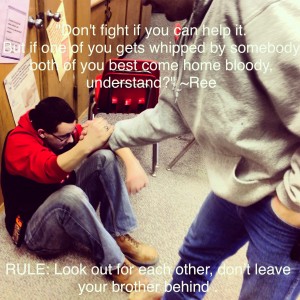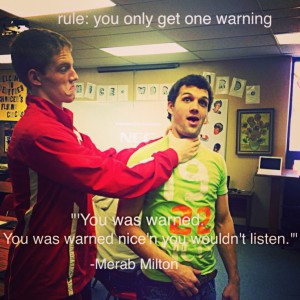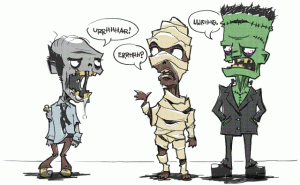
 Photo Credit: nebojsa mladjenovic via Compfight
Photo Credit: nebojsa mladjenovic via Compfight
My students are all playing a variation of the 11 (wo)man/sunshine award game that I played with some friends over this past winter break. In the spirit of sharing, and playing by my rule of “If I ask them to do it, I should probably try it on for size too, I told my young bloggers that they could pose some questions to me too. The results are below.
Trevor C:
What do you like about being a teacher?
This is a hard one because I like many things about being a teacher. One thing is that I get to hang out with young people all day Monday through Friday and it is hard to rival the spirit of a young mind. The other thing is that one of my favorite things to do is learn. Working for an institution of learning is a dream come true for me. In this job, I am always learning–from my students, from my colleagues, from books, from successes and from failures in the classroom.
Colleen A:
If you could only eat one thing for the rest of your life, what would it be and why?
I decided to do a little research on this because optimally, if I was faced with eating one food for the rest of my life, I would want to survive for as long as possible. After discovering the answer, as confirmed by several savory and unsavory sites in a wide range of credibility, I discovered that milk is probably my best bet. However, I STRONGLY DISLIKE MILK. Gag. This caused me to change my approach. Since this is a hypothetical question, I will answer it hypothetically, and just choose a food that I love. I’m going to go with pasta. It’s delicious and you can sneak interesting ingredients into it. It also comes in a wide array of shapes, which would help with the boredom factor of eating a single food for the rest of my life. However, if this situation came to fruition, it seems that it would result in my eventual organ failure, which, frankly, does not sound like a good time.
Jessie G:
Have you always wanted to be a drama teacher?
Since I was a child, I enjoyed both “playing school” and going to the theater. My mom was a 4th grade teacher, so I grew up valuing education and learning and my parents did right by me in exposing me to all sorts of artistic experiences. However, the idea of TEACHING THEATER really did not occur to me until it was right in my lap. Due to a set of circumstances I could not have predicted, the drama classes and fall play director position opened up, and due to my appreciation of theater and (some very limited) experience in theater, it seemed like a good opportunity, so I took it. I am really happy I did.
Connor D:
Why did you become an English teacher?
I love reading and I love writing. I also think teenagers are the coolest, so it seemed like a perfect fit.
If you didn’t want to be come a teacher what would your profession be?
Most likely, I would be a writer or an artist (or both). I would also most likely be very poor.
Cheyenne M + Mack B:
What is your favorite movie and why?
One of my favorite movies is Beetlejuice because it’s funny and macabre. Another is Tommy Boy because it is so funny. I also love the movie Dancer in the Dark because it is like no other movie I’ve ever seen and it ingeniously captures the beauty of musical theater in a very tragic way. Shawshank Redemption is a another marvelously clever and heartbreaking movie. The Princess Bride is one that I could watch over and over and never tire of it–same goes for The Neverending Story and Elf.I have so many favorite movies. I cannot pick just one! I could do a whole blog post about favorite movies … maybe even a whole blog …
Joe N:
What would you do if you were givin 10 billion dollars?
I would take care of my church and family. Then I would open a school with a focus on student interest and fine arts integration–with a hand-picked staff. Then I would try to give away as much of it as I could as fast as I could to help as many people as I could.
Jordan R:
What’s your least favorite thing about teaching?
In all honesty, it’s the grading system. I want students to learn for the sake of learning and I see so many of my students stressing themselves out about getting the A. Don’t get me wrong, I appreciate students who are eager to achieve, but it makes me sad to hear a student say that s/he crammed to get an A on the test, but afterward can’t remember a single thing that was on it. I wish I could inspire more students (and parents and colleagues) to be in it for self-improvement and learning.
Rachel S:
What is your favorite body part?
I think eyes are super cool. They are a really complicated part of the body and play such an important role in conveying body language.
Michelle K:
If you could modify a snail to go faster, how would you modify it?
If the goal is to get the snail to go faster than it normal goes, I would give it a good meal and some warm words of encouragement. I would modify its attitude.
Susan S:
Would you rather be on the stage or work backstage?
I’ll take a behind-the-scenes position over a performance position any day of the week. I like to contribute to artistic endeavors, but I would prefer to do so without a spotlight trained on me.
How did you get the name Xiola for, well, Xiola?
It’s from a song.
What is your favorite color?
BLACK. Some people say black is not a color, but I say, I can see it; I know what it looks like; and I love it. Strangely enough, black has been my favorite color since I was a wee lass. My grandma asked me what my favorite color was when I was 4 and I told her “black.” She said, “No it’s not!” I said, “Yes it is. I love black licorice jelly beans and I love the color black.”
What is your favorite musical?
This is another one of those “choose your favorite child” questions. I have many, but as of late, I’m really digging Wicked. I’ve been fortunate enough to see it twice and the music is astounding. It hits me right in the heart. The message is beautiful too. Incidentally, I used to HATE musicals. I also used to hate onions. Now I love them both.
Of all three one-act plays you have done, which was your favorite and why?
I would have to vote for The Happy Prince. It was challenging and the message was quite meaningful to me. It was also the most artistic of the three I’ve directed.
Taylor B:
If you could travel to any place in the world, where would it be?
I would probably pick Belize because my husband and I intended to go there over 12 years ago when we were first married, but we were unable to. It would be nice to finally take our honeymoon.
Danny C:
Have you ever invented your own words?
Oh yes indeedly-do. Shakespeare did it. So can I!
Jacob W:
Why do you think that there are mimes in the world? What purpose do they serve beyond entertainment?
Mimes were put on earth to express things that cannot be expressed in words. (Where did you come up with this question? Hahaah!)
If anyone could get their stories published and printed regardless of social status and quality of work, what impact would that have on modern literature?
Well, I hate to say it, but there would be a whole bunch of bad literature out there. Honestly, online/self-publication has made this possible. This is sort of happening right now. However, it also allows people with high quality work that, for whatever reason, hasn’t received the notice it deserved, to get recognition. Therefore, like most things, there are pros and cons.
Jenna W:
Why do birds always fly into your window? Do they like really love you or do you they really hate you?
I would like to think that it has nothing to do with love or hate or really anything about me at all. I believe they fly into my window because either A. our custodians have done such a nice job of cleaning my windows that they don’t realize there is glass there, OR B. the trees outside my window are reflected in the glass and the birds believe they are landing on a tree branch. The signs that I put up seem to be doing to trick as of late … or maybe it’s the papier-mâché albatross that a parent made for our fall play that has stopped the senseless bird concussions.
Josh H:
If you could choose to either be a play director or a teacher what would you choose and why?
Luckily, I don’t have to choose, because I can be both in my current position. That being said, I wouldn’t mind a career change at some point in my life and directing would be a possibility. This won’t be happening for a long while though. You’re stuck with me for now.







